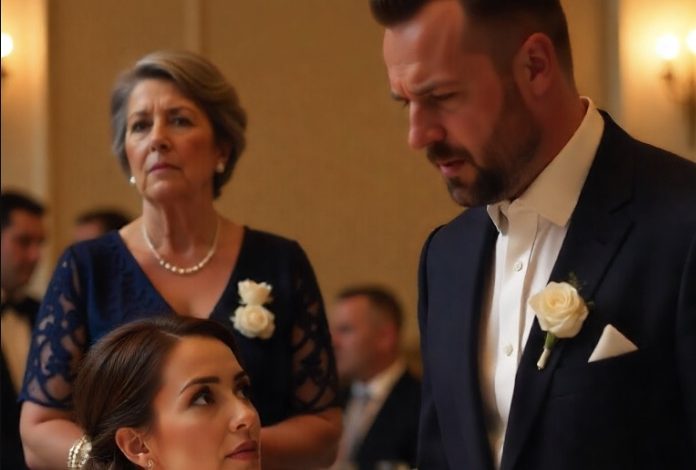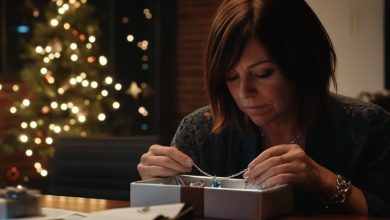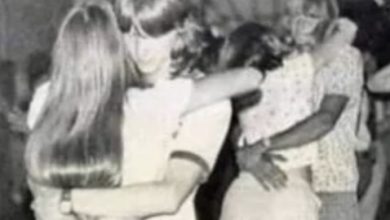“She Thought She Was Being Cast Aside at the Wedding, Until the Groom Revealed the Truth”

At my daughter’s wedding, she lifted her champagne glass and said, “The people I call my family are the ones who truly make me happy.” The crowd clapped and cheered. Then she turned, found my eyes across the elegant room, and with a cold edge in her voice said, “You can leave.”
I pushed myself up from the chair, my hands trembling. But before I could take a single step, Theodore, her groom, also stood. What he did next froze the entire room in silence.
But before I tell you about that moment—the moment that ended one chapter of my life and began another—I need to tell you how it all started.
That morning I was in my small apartment, preparing carefully. My wine-colored dress lay on the bed, pressed flat and neat, every crease gone. At sixty-seven, I still worried about looking right for Grace. I wanted her to see me not as a mistake from her past, but as a mother worthy of respect. I sprayed a little rose perfume on my wrists, the same perfume I had worn when Grace was a child. The scent mixed with the fading smell of my morning coffee. My stomach was tight with nerves; I had only managed a single piece of toast for breakfast.
Today was the biggest day of my daughter’s life. I wanted to be perfect for her. As I fastened the pearl earrings that had belonged to my own mother, memories flooded back—long nights spent at Grace’s bedside with a damp cloth cooling her fever, the bedtime stories I had read until my voice cracked, the years of double shifts so she could attend the best school.
Today she would see me, I told myself. Today she would remember everything.
The phone rang, breaking my thoughts. It was Victoria, my younger sister.
“Amelia, how are you? Are you ready for the big day?”
“I’m more than ready,” I said softly, feeling my throat tighten. “I just know today everything will change between Grace and me.”
Victoria was quiet for a moment. She knew the history—how our bond had frayed after Grace moved in with Theodore. The visits had become rare, the calls even rarer. “Take care of yourself, sister,” she said gently. “Don’t expect too much.”
But my heart had already decided. Today would be the day of our reconciliation. I picked up the gift I had saved for months to buy—a fine china set. Each plate was an unspoken apology. Each cup, a silent promise. I had even sold my wedding ring to pay the final balance.
The taxi arrived at two o’clock. During the drive, I imagined Grace’s face lighting up when she saw me. I pictured a warm hug, a smile, a moment of forgiveness that would heal us both.
The church was draped in white and pale pink flowers, like a dream. I arrived early to get a good seat near the front, where Grace could see me. But when I approached the first rows, the wedding planner blocked me politely.
“Excuse me, ma’am. These seats are for immediate family.”
“I’m the mother of the bride,” I said with a proud smile.
He frowned at his list. “I’m sorry, but it says here you’re seated in the fifth row.”
The fifth row. My smile faltered. I sat where I was told, among strangers, while the front rows filled with Theodore’s family and Grace’s colleagues—people who had entered her life long after I had.
Then the music began, and Grace walked down the aisle in her white dress, radiant. My heart swelled. This is just a misunderstanding, I told myself. At the reception, things will be different.
The reception hall was as elegant as a palace, with a view of a beautiful garden. I arrived holding my gift, looking for my table. When I found it, my heart sank. Table number eight, in the far corner by the swinging kitchen doors. From there, the bride and groom were just distant figures.
“Are you related to the bride?” an older woman asked me politely.
“I’m her mother,” I replied, forcing a smile.
She blinked, clearly surprised. Why was the mother of the bride seated so far away? I wondered the same.
From my seat I watched Grace laugh with her friends and embrace Theodore’s mother with the warmth I hadn’t felt in years. Each gesture was a small cut to my heart. When dinner was served, the main tables received their meals first. By the time our table was served, the food was cold.
Then came the toasts. My heart sped up. Maybe now. Maybe she would acknowledge me.
Theodore spoke first, thanking his parents and friends with a moving speech. Then Grace rose, glowing, champagne in hand.
“I want to thank all the special people here today,” she said. “To the friends who became siblings, to the colleagues who became family.” My breath caught. Here it comes. “I’ve learned that family isn’t always the one who shares your blood.”
The words hit me like stones.
“The real family are the people who choose to stay, who support you, who help you grow. My chosen family are the ones who make me happy,” she said, raising her glass. The guests cheered.
I clung to a final, desperate hope. But then her eyes met mine. For the first time that night, she looked at me. And what I saw was not love. It was pure contempt.
“And I also want to say,” she went on, “that some people don’t deserve to be in this moment. People who only bring negativity and bitterness into our lives.”
Silence fell. Faces turned toward me. My cheeks burned.
“Mom,” she said finally, and the word felt like a sentence, “you can leave.”
Two hundred eyes watched me. My dress, once my pride, now felt like a costume. Slowly, I rose, trying to keep my dignity.
But then something unexpected happened. Theodore also stood. His jaw was tight with anger I had never seen before.
“What are you doing?” Grace whispered, tugging his arm. He pulled away and walked to the microphone.
“Grace,” he said, his voice ringing through the hall, “before your mother leaves, there’s something everyone should know.”
Grace turned pale. “Theodore, no. Don’t do this.”
“Don’t do what? Tell the truth?” His voice cut like steel. “Because I know the truth about your mother.”
I gripped the back of my chair to steady myself.
“When we first met,” Theodore said, “you told me your mother was bitter and controlling, that she criticized everything you did. You said she had never supported you, that she was toxic.”
Each word was a blow.
“I believed you,” he continued, “because I trusted you. But a month ago I decided to check for myself. I spoke to Ms. Victoria, Amelia’s sister. I wanted to know the full story before our wedding. And what I discovered shocked me.”
My heart pounded.
“It turns out Amelia is not the bitter woman you described. She was widowed when you were twelve. She worked eighteen-hour days to raise you alone.” He stepped forward. “She sold her house, her jewelry, her furniture—everything—to pay for your university. She worked as a maid, as a waitress, as anything she could, so you never lacked for anything.”
Tears blurred my vision.
“And in the three years we’ve been together,” Theodore asked, “do you know how many times you’ve visited your mother? Three. Three times. Do you know how many calls you’ve rejected from her? Countless.”
The hall was still.
“What shocked me most,” Theodore said, “was learning that even during your first year after university, Amelia sent you money she needed for her own medicine. She sold her wedding ring to buy your final semester.” He turned to me, his eyes soft now. “Mrs. Amelia, I didn’t know. I thought you were as terrible as Grace said. Now I see you’re the bravest, most selfless woman I’ve met.”
Grace was sobbing.
“The worst part,” Theodore said to her, “is that when I asked if you wanted your mother at our wedding, you said she didn’t deserve it. And now, here, you humiliate her publicly.” He turned to me again. “Mrs. Amelia, I can’t marry someone who treats her own mother like this. I can’t start a family with a woman who shows such contempt for the person who gave her life.”
Grace gasped. “No, Theodore, please! We can fix this!”
But he had already taken off his wedding ring. “Ladies and gentlemen,” he said, facing the stunned guests, “this wedding will not take place.”
The hall erupted in murmurs. Grace collapsed, her dress spreading around her like broken wings.
“Mom!” she cried, “Please tell him to stay! Tell him we can fix this!”
But I was already walking to the door, my head high.
I sat on a bench in the garden, the cool air hitting my face. My phone rang. It was Victoria.
“Amelia, are you okay?”
“I’m… confused,” I said quietly.
“Be proud. For the first time in years, someone defended you.”
“But Grace…”
“She just learned the biggest lesson of her life.”
As I hung up, Grace ran out, mascara streaked. She fell to her knees. “Mom, please forgive me! I was awful to you.”
I looked at her. “Do you know how many nights I wondered what I had done wrong? At what point I stopped being a good mother?”
“You never stopped,” she sobbed.
“But you stopped being a daughter.”
“Theodore left me,” she wailed. “I lost everything.”
“No, Grace. You lost him because of who you became.”
Victoria’s car pulled up. It was time to go.
“What am I going to do without you?”
“You’ll live with the consequences of your choices. You’ll learn that love is not something you take for granted.”
That night I slept at Victoria’s. I woke up at dawn with a strange feeling—not happiness, but peace.
Three days later, Grace showed up at the door, a wreck. “Mom, please, I need you.”
“You need me to solve your problems, like always?”
“Both! You’re my mother!”
“Grace, you’ve never asked how I feel. If you want a relationship, it will be on my terms. You’ll go to therapy. You’ll think about why Theodore left. If you want to rebuild with me, you’ll start from zero.”
“What if I can’t?”
“Then you’ll live with the consequences.”
For the first time in my life, I didn’t run after her as she walked away.
Two weeks later, Theodore called me. We met in a café.
“I’m starting a community center for women like you,” he said. “Women who gave everything and were made invisible. I don’t want your money, Amelia. I want your experience. Your strength.”
I opened the folder he handed me. Inside were blueprints for a beautiful space.
“Why me?” I asked.
“Because at that wedding, when you stood with dignity, I saw true courage.”
Tears filled my eyes.
Six months later, I stood in front of the mirror in my new apartment, wearing an emerald dress for the grand opening of the New Dawn Women’s Center. My eyes sparkled with purpose.
“Six months ago,” I told the crowd that day, “my daughter kicked me out of her wedding. I thought my life was over. But I discovered my worth doesn’t depend on someone else’s love. That day forced me to find my own strength and my own chosen family.”
The applause shook the room.
At the back, I saw Grace, humbler now. She approached timidly.
“Mom, I’m in therapy. I know I don’t deserve your forgiveness. But I understand now what you sacrificed.”
“I’m glad you’re working on yourself,” I said gently. “But I no longer need your approval to be happy. I’ve found my own path.”
“I know,” she whispered. “That’s what hurts the most.”
Two years later, the center had become a national foundation. Grace visited my office, serene. “I’m volunteering now,” she said. “I’ve learned what it means to serve.”
I looked at her. “We can try to know each other again. But this time, you’ll be a part of my life, not the center of it.”
“I understand,” she said. “I’m proud of you.”
I smiled. “In order to be a good mother, I first had to become Amelia—a woman with her own dreams. And now, maybe, I can be both.”










